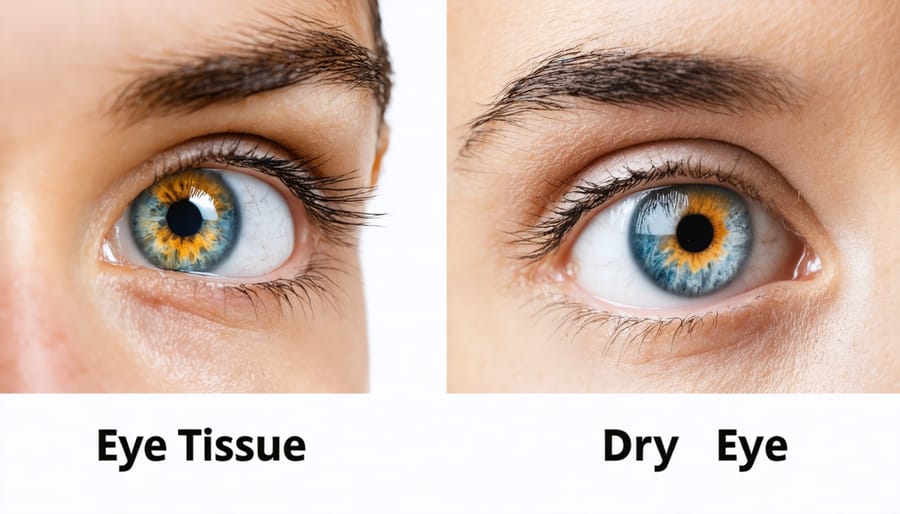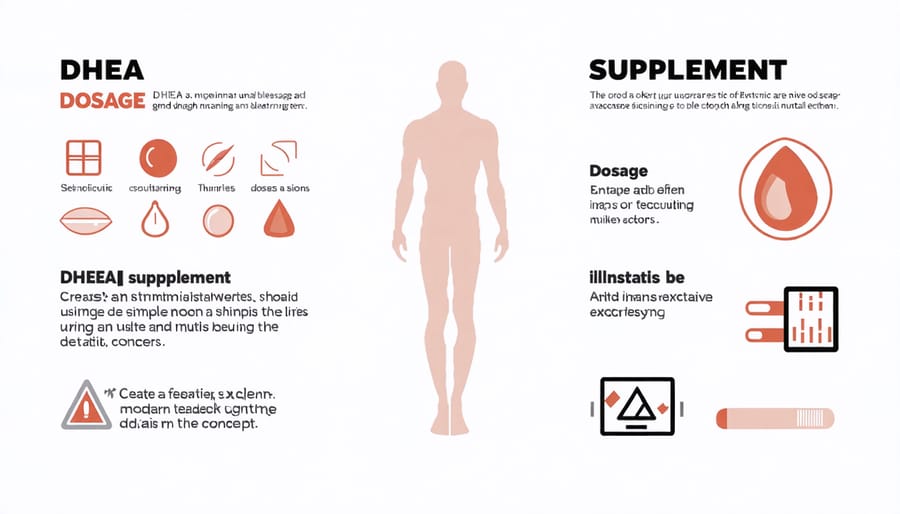DHEA supplements emerge as a promising frontier in eye health research, with studies suggesting potential benefits for age-related vision concerns. As the alchemy expert community increasingly recognizes, this naturally occurring hormone may play a crucial role in maintaining retinal function and protecting against oxidative stress. Recent clinical investigations reveal how how eyes reflect overall health through their response to DHEA supplementation, particularly in addressing dry eye syndrome and macular degeneration risks. While research continues to evolve, emerging evidence points to DHEA’s potential in supporting the intricate network of cells and tissues that maintain optimal vision, especially among aging adults. This comprehensive exploration delves into the scientific backing, practical applications, and safety considerations of DHEA supplementation for eye health maintenance and disease prevention.
Understanding DHEA’s Role in Eye Health

Natural DHEA Production and Eye Function
DHEA (dehydroepiandrosterone) is naturally produced by the adrenal glands, with peak levels occurring in early adulthood. This important hormone serves as a precursor to both male and female sex hormones and plays a crucial role in various bodily functions, including eye health.
The eye contains specialized tissues that can process and utilize DHEA. Research has shown that DHEA receptors are present in different parts of the eye, including the retina, cornea, and lens. As we age, natural DHEA production gradually declines, which may contribute to various age-related eye conditions.
The body’s production of DHEA follows a daily rhythm, with highest levels typically occurring in the morning hours. This hormone can be converted into other beneficial compounds directly within eye tissues, supporting their function and maintenance. Understanding this natural production process is essential for comprehending how DHEA supplements might benefit eye health, particularly in older adults when natural levels have decreased significantly.
Age-Related Changes in DHEA Levels
DHEA (Dehydroepiandrosterone) is a naturally occurring hormone that plays a vital role in various bodily functions, including maintaining eye health. Our bodies typically produce peak levels of DHEA during our mid-20s, after which production steadily declines. By age 70, most people’s DHEA levels have decreased to about 10-20% of their youthful levels.
This age-related decline in DHEA production coincides with an increased risk of various eye conditions and vision problems. Research suggests that lower DHEA levels may contribute to age-related macular degeneration, dry eye syndrome, and other ocular health issues commonly seen in older adults.
The relationship between declining DHEA levels and eye health has prompted interest in supplementation as a potential preventive measure. While the body’s natural decrease in DHEA production is normal, understanding this decline helps healthcare providers and patients make informed decisions about supplementation strategies, particularly for those concerned about maintaining their vision as they age.
Research on DHEA Supplements and Eye Conditions
Dry Eye Syndrome
Research has shown promising connections between DHEA supplements and the management of dry eye syndrome, particularly in postmenopausal women. DHEA, a hormone that naturally declines with age, appears to play a crucial role in maintaining the health of tear-producing glands and supporting the eye’s surface moisture.
Clinical studies have demonstrated that DHEA supplementation can increase tear production and improve tear film stability. In one significant study, participants who took DHEA supplements for three months reported reduced eye discomfort and showed measurable improvements in tear production tests.
The hormone works by supporting the function of meibomian glands, which produce the oily layer of tears that prevents rapid evaporation. Additionally, DHEA helps maintain the health of corneal epithelial cells, which are essential for eye surface protection and moisture retention.
However, it’s important to note that while these findings are encouraging, DHEA supplementation should only be undertaken under medical supervision. The optimal dosage varies among individuals, and regular monitoring is necessary to ensure safety and effectiveness in treating dry eye symptoms.

Age-Related Eye Changes
As we age, our eyes undergo natural changes that can affect vision quality and overall eye health. Research suggests that DHEA levels naturally decline with age, potentially contributing to various age-related eye conditions. Recent studies have shown promising results regarding DHEA’s role in protecting against age-related macular degeneration (AMD) and cataracts, two of the most common age-related eye disorders.
Clinical trials have demonstrated that DHEA may help maintain the health of retinal cells and protect against oxidative stress, a key factor in age-related eye deterioration. While many people turn to various supplements for eye health, DHEA’s unique properties make it particularly interesting for age-related eye care.
Research indicates that DHEA supplementation might help maintain proper tear production and reduce dry eye symptoms, which become more prevalent with age. Additionally, some studies suggest that DHEA could help preserve the elasticity of the lens, potentially slowing the progression of age-related vision changes.
However, more extensive research is still needed to fully understand the relationship between DHEA supplementation and age-related eye health improvements. Current evidence, while promising, remains preliminary in nature.
Other Eye Conditions
Research suggests that DHEA may influence various other eye conditions beyond age-related concerns. Studies have shown potential benefits for retinal function and corneal health, though more research is needed to fully understand these effects. Some preliminary findings indicate that DHEA might help support tear production in cases of dry eye syndrome and could play a role in maintaining overall ocular surface health. Scientists are also investigating its potential protective effects against oxidative stress in the eyes, which can contribute to various vision problems. However, it’s important to note that while these findings are promising, most studies are still in early stages, and more clinical trials are needed to confirm these potential benefits. Always consult an eye care professional before using DHEA supplements for any specific eye condition.
Safety and Usage Considerations

Recommended Dosages
The recommended dosage of DHEA supplements varies depending on age, gender, and individual health conditions. For adults seeking eye health benefits, typical daily doses range from 25 to 50 mg, though some healthcare providers may recommend different amounts based on specific needs and DHEA blood levels.
Women generally require lower doses than men, typically starting at 25 mg daily, while men may begin with 50 mg daily. It’s crucial to start with the lowest effective dose and gradually increase if necessary under medical supervision.
Timing matters when taking DHEA supplements. Most experts recommend taking them in the morning with food to mirror the body’s natural DHEA production rhythm and minimize potential side effects.
Regular monitoring through blood tests is essential to maintain optimal DHEA levels. Individuals over 40 may require different dosages as natural DHEA production decreases with age.
Important: Do not start DHEA supplementation without consulting a healthcare provider, especially if you have existing eye conditions or are taking other medications. Self-adjusting dosages can lead to adverse effects and may interfere with eye health rather than support it.
Potential Side Effects
While DHEA supplements are generally considered safe when used as directed, they can cause several side effects that users should be aware of. Common side effects include acne, hair loss, stomach upset, and changes in menstrual cycle for women. Some users may experience mood changes, including irritability or depression.
Due to DHEA’s role as a hormone precursor, it may affect hormone levels in the body. This can lead to symptoms such as deepening of the voice in women, facial hair growth, and changes in blood pressure. People with hormone-sensitive conditions should exercise particular caution.
When it comes to eye health specifically, some users have reported temporary blurred vision or changes in visual perception. These symptoms typically resolve when supplementation is discontinued. However, individuals with existing eye conditions should consult their healthcare provider before starting DHEA supplements.
Drug interactions are another important consideration. DHEA may interact with medications including antidepressants, blood thinners, and hormone treatments. It’s essential to discuss potential interactions with your healthcare provider, especially if you’re taking any medications for eye-related conditions.
Pregnant women, nursing mothers, and individuals with liver problems should avoid DHEA supplements entirely.
Who Should Avoid DHEA
Certain individuals should avoid DHEA supplements due to potential health risks. Pregnant and nursing women should not take DHEA as it may affect hormone levels and fetal development. People with hormone-sensitive conditions, including breast cancer, ovarian cancer, or prostate cancer, should strictly avoid DHEA supplementation. Those with liver disease, diabetes, or bleeding disorders should consult their healthcare provider before considering DHEA. Individuals taking medications such as antidepressants, blood thinners, or hormone treatments should also exercise caution. It’s essential to maintain regular eye examinations and discuss any supplement use with your eye care professional, especially if you have pre-existing eye conditions or are at risk for eye-related complications.
The research on DHEA supplementation and eye health shows promising but mixed results. While some studies suggest potential benefits for certain eye conditions, particularly age-related macular degeneration and dry eye syndrome, more comprehensive clinical trials are needed to establish definitive conclusions. Before considering DHEA supplements for eye health, it’s essential to consult with an eye care professional who can evaluate your specific needs and risk factors.
For those interested in DHEA supplementation, current evidence suggests starting with lower doses and monitoring for any side effects. Remember that DHEA is not a replacement for regular eye examinations, a healthy diet, or other established eye care practices. The most effective approach to eye health combines multiple strategies, including proper nutrition, regular check-ups, and lifestyle modifications.
Safety considerations are paramount, as DHEA can interact with various medications and may not be suitable for everyone. Pregnant women, individuals with hormone-sensitive conditions, and those with certain medical conditions should avoid DHEA supplementation. Always prioritize evidence-based approaches to eye health and work with healthcare providers to develop a personalized eye care plan.

